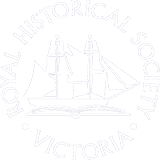Alfred Wooley Greig (1873-1944)
1923-1925
Greig was born in 1873 on the present site of the Victorian Barracks. His father was James Saunders Grieg, who was the superintendent and resident secretary of the Immigrants Home, a shelter for deserted wives and children and disabled. In 1913, Alfred joined the registrar’s office at the Melbourne University, becoming chief clerk in 1920 and holding the registrar position between 1937-1939.
Alfred however will forever be a major figure in the development of the RHSV. He is credited as a co-founder of the RHSV, along with William John Hughston and Edward Augustus Petherick in 1909 and in the Inaugural meeting was the first honorary secretary. He stayed on the council until his death in 1944. A keen historian, he wrote 18 articles for the Victorian Historical Magazine, co-wrote Victoria: the First Century(1934), and Notes on the history of local government in Victoria, which at the time of his death was described as “held in high regard by scholars” (VHM, p.102, vol.20, No.3, 1944). He also wrote articles on the history of Melbourne for the Argus.
(A.S.)
Sir Frank Madden (Politician, brother of Walter Madden, 1847-1921)1909-1921
http://adb.anu.edu.au/biography/madden-sir-frank-7452
Was born in Cork, Ireland, and moved to Victoria in 1857. After a stint as a Jackaroo, he studied at the University of Melbourne as a non-matriculated student and admitted as an attorney by 1869. He founded the law firm Madden and Butler, and was president of the law institute from 1886-1887. In 1894 he entered the legislative assembly (the lower house of Victorian Parliament) as a member of the Eastern Suburbs (Boroondara).
Because of his extremist and conservative views (including being anti-suffrage) he never held a ministerial seat. However, he still held the role of speaker from 1904 to 1917. During World War One, he was a supporter of the Conscription, and publicly was against Irish Nationalism, going as far as publicly demanding Archbishop Mannix to be deported (leading to Frank’s eventual defeat in the assembly).
Whilst credited as the RHSV’s first president in 1909, and did chair the inaugural meeting of the Society (Vol 80, p.161), he was not an active member in his later years (1921 obituary in VHJ vol 8), and his role was mostly as a figurehead (Vol.70 of VHJ) whilst the Council Chairman (George V Vasey and Sir William W. Harrison Moore) helped run the Society. Despite this, he was still influential in securing government assistance in publishing the Society’s Victorian Historical Journal. Also being a lover of the land, and horses (being a member of the Victorian Racing club council), he published a pamphlet on Grass lands in Victoria and was a keen hunter. He was knighted in 1911 and died in 1921 in Kew, Victoria.
His brother Walter (1848-1925) was also a politician, being elected in the legislative assembly for Wimmera in 1880 and serving in the assembly until 1894. In that time, he served on several Royal Commissions for water supply and land titles, and spoke on issues for irrigation, rabbits and railways.
(A.S.)
Sir Ernest Scott (Historian, 1867-1939)1921-1923
http://adb.anu.edu.au/biography/scott-sir-ernest-8367
Born in 1867 in Northampton, England, Ernest started his career as a reporter, work for The Globe Newspaper before migrating to Melbourne in 1892. He soon joined the Herald newspaper and during his time there would report on the fallout of the 1890s depression and the Federation movement. In 1895 he switched jobs to Hansard writing, writing transcripts for the Victorian Parliament, and later the Commonwealth parliament (1901-1913).
Despite his journalistic roots, he was also a keen historian. He wrote books surrounding the European discovery of Australia, including Terre Napoleon: A History of French Explorations and Projects in Australia (1910), and The Life of Captain Matthew Flinders R.N (1914). He also wrote a chronology of Australia, titled A Short History of Australia (1916). He became of such high regard that in 1914 he was offered the chair of History at the Melbourne University, a position he held for over 20 years despite never being a university student himself. During his tenure at the University, he revolutionised the way the study of history was approached at the institution. Believing historians needed to make use of historical material, he encouraged students to approach history as an inquiry, requiring active participation on the students’ part. Students were encouraged to use primary sources in their research. Amongst the pupils that studied under him include historians Sir William Hancock, and Manning Clark.
Referred to as a “prodigious worker” (biography) and a reputation for being honest and direct, Scott was an advocate for women’s rights and during the 1930’s was anti-fascist. He was president of the RHSV between 1921 and 1923 and wrote several articles for the Victorian Historical Magazine. He died in 1939, shortly after being knighted. The University of Melbourne has named an award after him to award works on the history of Australia.
(A.S.)

 239 A'Beckett Street Melbourne, Victoria, 3000
239 A'Beckett Street Melbourne, Victoria, 3000  03 9326 9288
03 9326 9288  office@historyvictoria.org.au
office@historyvictoria.org.au  Office & Library: Weekdays 9am-5pm
Office & Library: Weekdays 9am-5pm

